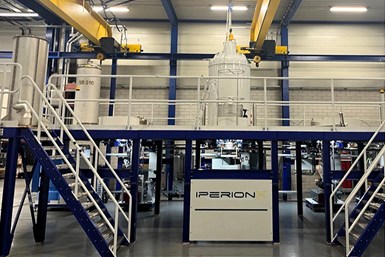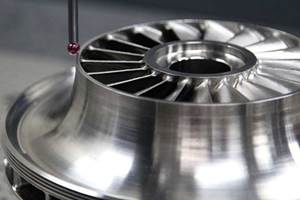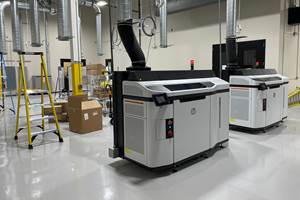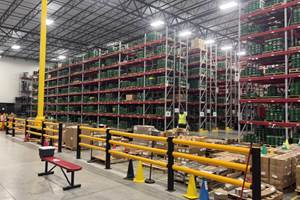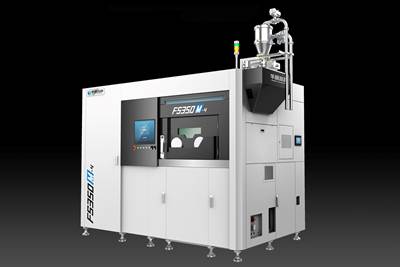IperionX Moves Closer to Commercial Scale US Titanium Production
IperionX’s HAMR titanium furnace, the foundation piece to produce low-cost titanium, has completed final mechanical assembly and successfully passed factory acceptance tests with the IPX technical team.
IperionX says it is making significant progress in advancing its commercial-scale titanium metal manufacturing capabilities at its Titanium Manufacturing Campus in Virginia, comprising the Titanium Production Facility and the Advanced Manufacturing Center.
IperionX has also received the first $2.4 million payment from the $12.7 million Department of Defense DPA Title III grant to fund Phase I ramp-up of the Virginia Titanium Production Facility.
Commercial Scale HAMR Titanium Furnace
The facility is being prepped for the HAMR titanium furnace which has completed final mechanical assembly and successfully passed factory acceptance testing overseen by the IperionX technical team. The furnace is being transported from the European manufacturer to the Titanium Manufacturing Campus in Virginia. This large-scale titanium furnace is expected to be installed within the Titanium Production Facility during the second quarter, paving the way for the production of titanium metal in mid-2024.
The furnace is a critical IperionX production asset. It is a large-scale, industrial titanium furnace utilizing patented company technologies, such as HAMR1 and HSPT2, to produce sustainable, high-quality and high-strength titanium metal products at commercial scale. The company says this first production milestone will combine leading innovation and sustainability to set new industry standards in titanium metal production.
Importantly, the application of this conventional furnace technology for titanium production has been de-risked via a comprehensive furnace test work program. In 2023, the IperionX technical team successfully completed two full-scale titanium production test runs that surpassed the core target production parameters for the Titanium Production Facility.
The construction progress of the Titanium Production Facility and the Advanced Manufacturing Center, both in Virginia, is advancing on schedule. The HAMR titanium furnace is expected to be commissioned and to produce first titanium metal in mid-2024. Construction of the Advanced Manufacturing Center is anticipated to be commissioned during the second quarter of 2024. This manufacturing facility will utilize angular and spherical titanium powders from the Titanium Production Facility to manufacture a wide range of low-cost and high-performance titanium products using powder metallurgy, HSPT forging and additive manufacturing (AM). It will also leverage CNC machining, postprocessing equipment and advanced R&D laboratories to support customer and government engagement.
“IperionX is nearing an important milestone designed to revitalize the U.S. titanium supply chain with a unique end-to-end solution that spans from recycled scrap titanium to high-performance forged titanium products,” says Anastasios (Taso) Arima, IperionX CEO. “Our patented titanium technologies can produce a wide range of high-performance titanium products — including angular and spherical titanium powders, semifinished titanium products, near-net titanium shape products and additively manufactured titanium components — with superior energy efficiency, lower costs and lower environmental impacts.”
The company says it has a strong pipeline of potential U.S. government funding and incentive programs designed to reshore and secure critical mineral and metal supply chains. “The commissioning of our Virginia Titanium Manufacturing Campus will be a pivotal step forward, positioning IperionX with an innovative end-to-end titanium supply chain capable of manufacturing high-performance and low-cost titanium products for advanced American industries,” Arima adds.
IperionX says it has developed an ‘end-to-end’ American titanium supply chain solution that spans from the production of domestically sourced titanium minerals, the technology to upgrade these minerals to +99% TiO2, as well as the ability to utilize the largest range of recycled scrap titanium as feedstocks for low-cost titanium metal production.
The company says it can produce low-cost and high-quality angular and spherical titanium powder to produce titanium semifinished stock products (such as ingot, bar, plate, wire and more) for advanced applications. It can also use these titanium powders to produce near-net forged titanium alloy shapes and high-value final titanium parts and components using AM.
Its technologies can produce a large range of high-strength forged titanium alloys at low cost, with sustainable, process energy efficiencies compared to other industry methods such as the Kroll process. IperionX’s patented technologies negate the need for titanium metal sponge and ingot, enabling direct manufacturing of higher value titanium products from the billet stage onward.
IperionX’s Titanium Manufacturing Campus in Virginia comprises both the Titanium Production Facility and the Advanced Manufacturing Center. The Titanium Production Facility will produce high-quality and low-cost angular and spherical titanium powders. These titanium metal powders will be marketed to a wide range of customers for use in additive and powder manufacturing. The high-quality titanium powders will also be an important low- cost internal feedstock for the Advanced Manufacturing Center, where they will be utilized to manufacture a wide range of higher value titanium products such as semifinished traditional mill products, near-net shape forged titanium components and high-value titanium products using additive manufacturing.
Related Content
Big Metal Additive: The Difference Between a Shape and a Part Is Quality
Preparing to scale directed energy deposition to ongoing full production is not a technological challenge: DED is ready. But it is an organizational challenge, says the company founder. Here is what it means to implement a quality system.
Read MoreVelo3D Founder on the 3 Biggest Challenges of 3D Printing Metal Parts
Velo3D CEO and founder Benny Buller offers this perspective on cost, qualification and ease of development as they apply to the progress of AM adoption in the future.
Read MoreWhat Does Additive Manufacturing Readiness Look Like?
The promise of distributed manufacturing is alluring, but to get there AM first needs to master scale production. GKN Additive’s Michigan facility illustrates what the journey might look like.
Read MoreDo Distributors Dream of Digital Inventory? Würth Additive Group Does
It’s more than a dream for Würth Additive Group and its parent company, in fact. Along with supplying additive equipment, the group is now developing solutions for sourcing 3D printed parts in a reliable, elastic digital inventory model.
Read MoreRead Next
Postprocessing Steps and Costs for Metal 3D Printing
When your metal part is done 3D printing, you just pull it out of the machine and start using it, right? Not exactly.
Read More3D Printed Polymer EOAT Increases Safety of Cobots
Contract manufacturer Anubis 3D applies polymer 3D printing processes to manufacture cobot tooling that is lightweight, smooth and safer for human interaction.
Read MoreBike Manufacturer Uses Additive Manufacturing to Create Lighter, More Complex, Customized Parts
Titanium bike frame manufacturer Hanglun Technology mixes precision casting with 3D printing to create bikes that offer increased speed and reduced turbulence during long-distance rides, offering a smoother, faster and more efficient cycling experience.
Read More




